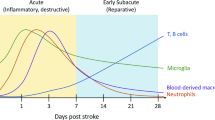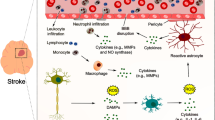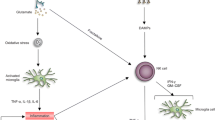Abstract
Inflammation plays a critical role in the pathogenesis of ischemic stroke. This process depends, in part, upon proinflammatory factors released by activated resident central nervous system (CNS) microglia (MG). Previous studies demonstrated that transfer of IL-10+ B-cells reduced infarct volumes in male C57BL/6 J recipient mice when given 24 h prior to or therapeutically at 4 or 24 h after experimental stroke induced by 60 min middle cerebral artery occlusion (MCAO). The present study assesses possible sex differences in immunoregulation by IL-10+ B-cells on primary male vs. female MG cultured from naïve and ischemic stroke-induced mice. Thus, MG cultures were treated with recombinant (r)IL-10, rIL-4 or IL-10+ B-cells after lipopolysaccharide (LPS) activation and evaluated by flow cytometry for production of proinflammatory and anti-inflammatory factors. We found that IL-10+ B-cells significantly reduced MG production of TNF-α, IL-1β and CCL3 post-MCAO and increased their expression of the anti-inflammatory M2 marker, CD206, by cell-cell interactions. Moreover, MG from female vs. male mice had higher expression of IL-4 and IL-10 receptors and increased production of IL-4, especially after treatment with IL-10+ B-cells. These findings indicate that IL-10-producing B-cells play a crucial role in regulating MG activation, proinflammatory cytokine release and M2 phenotype induction, post-MCAO, with heightened sensitivity of female MG to IL-4 and IL-10. This study, coupled with our previous demonstration of increased numbers of transferred IL-10+ B-cells in the ischemic hemisphere, provide a mechanistic basis for local regulation by secreted IL-10 and IL-4 as well as direct B-cell/MG interactions that promote M2-MG.








Similar content being viewed by others
Abbreviations
- BBB:
-
Blood brain barrier
- CNS:
-
Central nervous system
- MCAO:
-
Middle cerebral artery occlusion
- WT:
-
Wild-type
- TNF-α:
-
Tumor necrosis factor α
- CD:
-
Cluster of differentiation
- MHC II:
-
Major histocompatibility complex II
- RPMI:
-
Roswell Park Memorial Institute
- IL:
-
Interleukin
- FACS:
-
Fluorescence activated cell sorter
References
Alkayed NJ, Harukuni I, Kimes AS, London ED, Traystman RJ, Hurn PD (1998) Gender-linked brain injury in experimental stroke. Stroke 29:159–165, discussion 166
Allan SM, Tyrrell PJ, Rothwell NJ (2005) Interleukin-1 and neuronal injury. Nat Rev Immunol 5:629–640. doi:10.1038/nri1664
Banerjee A, Wang J, Bodhankar S, Vandenbark AA, Murphy SJ, Offner H (2013) Phenotypic changes in immune cell subsets reflect increased infarct volume in male vs. female mice. Transl Stroke Res 4:554–563. doi:10.1007/s12975-013-0268-z
Boche D, Perry VH, Nicoll JA (2013) Review: activation patterns of microglia and their identification in the human brain. Neuropathol Appl Neurobiol 39:3–18. doi:10.1111/nan.12011
Bodhankar S, Chen Y, Vandenbark AA, Murphy SJ, Offner H (2013) IL-10-producing B-cells limit CNS inflammation and infarct volume in experimental stroke. Metab Brain Dis 28:375–386. doi:10.1007/s11011-013-9413-3
Bodhankar S, Chen Y, Lapato A, Vandenbark AA, Murphy SJ, Saugstad JA, Offner H (2014a) Regulatory CD8CD122 T-cells predominate in CNS after treatment of experimental stroke in male mice with IL-10-secreting B-cells. Metab Brain Dis. doi:10.1007/s11011-014-9639-8
Bodhankar S, Chen Y, Vandenbark AA, Murphy SJ, Offner H (2014b) Treatment of experimental stroke with IL-10-producing B-cells reduces infarct size and peripheral and CNS inflammation in wild-type B-cell-sufficient mice. Metab Brain Dis 29:59–73. doi:10.1007/s11011-013-9474-3
Butovsky O et al (2006a) Induction and blockage of oligodendrogenesis by differently activated microglia in an animal model of multiple sclerosis. J Clin Invest 116:905–915. doi:10.1172/JCI26836
Butovsky O et al (2006b) Microglia activated by IL-4 or IFN-gamma differentially induce neurogenesis and oligodendrogenesis from adult stem/progenitor cells. Mol Cell Neurosci 31:149–160. doi:10.1016/j.mcn.2005.10.006
Cherry JD, Olschowka JA, O’Banion MK (2014) Neuroinflammation and M2 microglia: the good, the bad, and the inflamed. J Neuroinflammation 11:98. doi:10.1186/1742-2094-11-98
Chu M et al (2012) Focal cerebral ischemia activates neurovascular restorative dynamics in mouse brain. Front Biosci (Elite Ed) 4:1926–1936
de Bilbao F, Arsenijevic D, Moll T, Garcia-Gabay I, Vallet P, Langhans W, Giannakopoulos P (2009) In vivo over-expression of interleukin-10 increases resistance to focal brain ischemia in mice. J Neurochem 110:12–22. doi:10.1111/j.1471-4159.2009.06098.x
Denes A, Ferenczi S, Halasz J, Kornyei Z, Kovacs KJ (2008) Role of CX3CR1 (fractalkine receptor) in brain damage and inflammation induced by focal cerebral ischemia in mouse. J Cereb Blood Flow Metab 28:1707–1721. doi:10.1038/jcbfm.2008.64
Denker SP, Ji S, Dingman A, Lee SY, Derugin N, Wendland MF, Vexler ZS (2007) Macrophages are comprised of resident brain microglia not infiltrating peripheral monocytes acutely after neonatal stroke. J Neurochem 100:893–904. doi:10.1111/j.1471-4159.2006.04162.x
Draheim HJ, Prinz M, Weber JR, Weiser T, Kettenmann H, Hanisch UK (1999) Induction of potassium channels in mouse brain microglia: cells acquire responsiveness to pneumococcal cell wall components during late development. Neuroscience 89:1379–1390
Ekdahl CT, Claasen JH, Bonde S, Kokaia Z, Lindvall O (2003) Inflammation is detrimental for neurogenesis in adult brain. Proc Natl Acad Sci U S A 100:13632–13637. doi:10.1073/pnas.2234031100
Floden AM, Combs CK (2007) Microglia repetitively isolated from in vitro mixed glial cultures retain their initial phenotype. J Neurosci Methods 164:218–224. doi:10.1016/j.jneumeth.2007.04.018
Fumagalli S, Perego C, Ortolano F, De Simoni MG (2013) CX3CR1 deficiency induces an early protective inflammatory environment in ischemic mice. Glia 61:827–842. doi:10.1002/glia.22474
Gadani SP, Cronk JC, Norris GT, Kipnis J (2012) IL-4 in the brain: a cytokine to remember. J Immunol 189:4213–4219. doi:10.4049/jimmunol.1202246
Gingras M, Gagnon V, Minotti S, Durham HD, Berthod F (2007) Optimized protocols for isolation of primary motor neurons, astrocytes and microglia from embryonic mouse spinal cord. J Neurosci Methods 163:111–118. doi:10.1016/j.jneumeth.2007.02.024
Giulian D, Baker TJ (1986) Characterization of ameboid microglia isolated from developing mammalian brain. J Neurosci 6:2163–2178
Gregersen R, Lambertsen K, Finsen B (2000) Microglia and macrophages are the major source of tumor necrosis factor in permanent middle cerebral artery occlusion in mice. J Cereb Blood Flow Metab 20:53–65. doi:10.1097/00004647-200001000-00009
Hallenbeck JM (2002) The many faces of tumor necrosis factor in stroke. Nat Med 8:1363–1368. doi:10.1038/nm1202-1363
Hanisch UK, Kettenmann H (2007) Microglia: active sensor and versatile effector cells in the normal and pathologic brain. Nat Neurosci 10:1387–1394. doi:10.1038/nn1997
Heyen JR, Ye S, Finck BN, Johnson RW (2000) Interleukin (IL)-10 inhibits IL-6 production in microglia by preventing activation of NF-kappaB. Brain Res Mol Brain Res 77:138–147
Horvath RJ, Nutile-McMenemy N, Alkaitis MS, Deleo JA (2008) Differential migration, LPS-induced cytokine, chemokine, and NO expression in immortalized BV-2 and HAPI cell lines and primary microglial cultures. J Neurochem 107:557–569. doi:10.1111/j.1471-4159.2008.05633.x
Hu X et al (2012) Microglia/macrophage polarization dynamics reveal novel mechanism of injury expansion after focal cerebral ischemia. Stroke 43:3063–3070. doi:10.1161/STROKEAHA.112.659656
Hu X, Leak RK, Shi Y, Suenaga J, Gao Y, Zheng P, Chen J (2015) Microglial and macrophage polarization-new prospects for brain repair. Nat Rev Neurol 11:56–64. doi:10.1038/nrneurol.2014.207
Jalal FY, Yang Y, Thompson J, Lopez AC, Rosenberg GA (2012) Myelin loss associated with neuroinflammation in hypertensive rats. Stroke 43:1115–1122. doi:10.1161/STROKEAHA.111.643080
Kelley KW, Bluthe RM, Dantzer R, Zhou JH, Shen WH, Johnson RW, Broussard SR (2003) Cytokine-induced sickness behavior. Brain Behav Immun 17(1):S112–S118
Kissela B et al (2009) Clinical prediction of functional outcome after ischemic stroke: the surprising importance of periventricular white matter disease and race. Stroke 40:530–536. doi:10.1161/STROKEAHA.108.521906
Kobayashi K et al (2013) Minocycline selectively inhibits M1 polarization of microglia. Cell Death Dis 4:e525. doi:10.1038/cddis.2013.54
Kwon MJ et al (2013) Contribution of macrophages to enhanced regenerative capacity of dorsal root ganglia sensory neurons by conditioning injury. J Neurosci 33:15095–15108. doi:10.1523/JNEUROSCI.0278-13.2013
Ladecola C, Anrather J (2011) The immunology of stroke: from mechanisms to translation. Nat Med 17:796–808. doi:10.1038/nm.2399
Lalancette-Hebert M, Gowing G, Simard A, Weng YC, Kriz J (2007) Selective ablation of proliferating microglial cells exacerbates ischemic injury in the brain. J Neurosci 27:2596–2605. doi:10.1523/JNEUROSCI.5360-06.2007
Lalancette-Hebert M et al (2012) Galectin-3 is required for resident microglia activation and proliferation in response to ischemic injury. J Neurosci 32:10383–10395. doi:10.1523/JNEUROSCI.1498-12.2012
Lehrmann E et al (1998) Microglia and macrophages are major sources of locally produced transforming growth factor-beta1 after transient middle cerebral artery occlusion in rats. Glia 24:437–448
Lenz KM, McCarthy MM (2015) A starring role for microglia in brain sex differences. Neuroscientist 21:306–321. doi:10.1177/1073858414536468
Liu Z et al (2007) Chronic treatment with minocycline preserves adult new neurons and reduces functional impairment after focal cerebral ischemia. Stroke 38:146–152. doi:10.1161/01.STR.0000251791.64910.cd
Loram LC et al (2012) Sex and estradiol influence glial pro-inflammatory responses to lipopolysaccharide in rats. Psychoneuroendocrinology 37:1688–1699. doi:10.1016/j.psyneuen.2012.02.018
Lund FE (2008) Cytokine-producing B lymphocytes-key regulators of immunity. Curr Opin Immunol 20:332–338. doi:10.1016/j.coi.2008.03.003
Madan R et al (2009) Nonredundant roles for B cell-derived IL-10 in immune counter-regulation. J Immunol 183:2312–2320. doi:10.4049/jimmunol.0900185
Mills CD, Kincaid K, Alt JM, Heilman MJ, Hill AM (2000) M-1/M-2 macrophages and the Th1/Th2 paradigm. J Immunol 164:6166–6173
Miron VE et al (2013) M2 microglia and macrophages drive oligodendrocyte differentiation during CNS remyelination. Nat Neurosci 16:1211–1218. doi:10.1038/nn.3469
Moussaud S, Draheim HJ (2010) A new method to isolate microglia from adult mice and culture them for an extended period of time. J Neurosci Methods 187:243–253. doi:10.1016/j.jneumeth.2010.01.017
Murphy SJ, McCullough LD, Smith JM (2004) Stroke in the female: role of biological sex and estrogen. ILAR J 45:147–159
Onwuekwe I, Ezeala-Adikaibe B (2012) Ischemic stroke and neuroprotection. Ann Med Health Sci Res 2:186–190. doi:10.4103/2141-9248.105669
Owens T, Wekerle H, Antel J (2001) Genetic models for CNS inflammation. Nat Med 7:161–166. doi:10.1038/84603
Parada E et al (2013) The microglial alpha7-acetylcholine nicotinic receptor is a key element in promoting neuroprotection by inducing heme oxygenase-1 via nuclear factor erythroid-2-related factor 2. Antioxid Redox Signal 19:1135–1148. doi:10.1089/ars.2012.4671
Patel AR, Ritzel R, McCullough LD, Liu F (2013) Microglia and ischemic stroke: a double-edged sword. Int J Physiol Pathophysiol Pharmacol 5:73–90
Pepe G, Calderazzi G, De Maglie M, Villa A, Vegeto E (2014) Heterogeneous induction of microglia M2a phenotype by central administration of interleukin-4. J Neuroinflammation 11:1031. doi:10.1186/s12974-014-0211-6
Perego C, Fumagalli S, De Simoni MG (2011) Temporal pattern of expression and colocalization of microglia/macrophage phenotype markers following brain ischemic injury in mice. J Neuroinflammation 8:174. doi:10.1186/1742-2094-8-174
Perez-de Puig I, Miro F, Salas-Perdomo A, Bonfill-Teixidor E, Ferrer-Ferrer M, Marquez-Kisinousky L, Planas AM (2013) IL-10 deficiency exacerbates the brain inflammatory response to permanent ischemia without preventing resolution of the lesion. J Cereb Blood Flow Metab 33:1955–1966. doi:10.1038/jcbfm.2013.155
Pousset F, Cremona S, Dantzer R, Kelley K, Parnet P (1999) Interleukin-4 and interleukin-10 regulate IL1-beta induced mouse primary astrocyte activation: a comparative study. Glia 26:12–21
Ransohoff RM, Brown MA (2012) Innate immunity in the central nervous system. J Clin Invest 122:1164–1171. doi:10.1172/JCI58644
Rosenzweig S, Carmichael ST (2013) Age-dependent exacerbation of white matter stroke outcomes: a role for oxidative damage and inflammatory mediators. Stroke 44:2579–2586. doi:10.1161/STROKEAHA.113.001796
Schilling M, Besselmann M, Muller M, Strecker JK, Ringelstein EB, Kiefer R (2005) Predominant phagocytic activity of resident microglia over hematogenous macrophages following transient focal cerebral ischemia: an investigation using green fluorescent protein transgenic bone marrow chimeric mice. Exp Neurol 196:290–297. doi:10.1016/j.expneurol.2005.08.004
Sica A, Mantovani A (2012) Macrophage plasticity and polarization: in vivo veritas. J Clin Invest 122:787–795. doi:10.1172/JCI59643
Sierra A, Gottfried-Blackmore AC, McEwen BS, Bulloch K (2007) Microglia derived from aging mice exhibit an altered inflammatory profile. Glia 55:412–424. doi:10.1002/glia.20468
Sozmen EG, Kolekar A, Havton LA, Carmichael ST (2009) A white matter stroke model in the mouse: axonal damage, progenitor responses and MRI correlates. J Neurosci Methods 180:261–272. doi:10.1016/j.jneumeth.2009.03.017
Stein M, Keshav S, Harris N, Gordon S (1992) Interleukin 4 potently enhances murine macrophage mannose receptor activity: a marker of alternative immunologic macrophage activation. J Exp Med 176:287–292
Sudlow CL, Warlow CP (1997) Comparable studies of the incidence of stroke and its pathological types: results from an international collaboration. Int Stroke Incidence Collab Stroke 28:491–499
Taylor RA, Sansing LH (2013) Microglial responses after ischemic stroke and intracerebral hemorrhage. Clin Dev Immunol 2013:746068. doi:10.1155/2013/746068
Taylor PR, Martinez-Pomares L, Stacey M, Lin HH, Brown GD, Gordon S (2005) Macrophage receptors and immune recognition. Annu Rev Immunol 23:901–944. doi:10.1146/annurev.immunol.23.021704.115816
Thored P et al (2009) Long-term accumulation of microglia with proneurogenic phenotype concomitant with persistent neurogenesis in adult subventricular zone after stroke. Glia 57:835–849. doi:10.1002/glia.20810
Towfighi A, Saver JL (2011) Stroke declines from third to fourth leading cause of death in the United States: historical perspective and challenges ahead. Stroke 42:2351–2355. doi:10.1161/STROKEAHA.111.621904
Wang G et al (2013) Microglia/macrophage polarization dynamics in white matter after traumatic brain injury. J Cereb Blood Flow Metab 33:1864–1874. doi:10.1038/jcbfm.2013.146
Xiong X, Barreto GE, Xu L, Ouyang YB, Xie X, Giffard RG (2011) Increased brain injury and worsened neurological outcome in interleukin-4 knockout mice after transient focal cerebral ischemia. Stroke 42:2026–2032. doi:10.1161/STROKEAHA.110.593772
Zaremba J, Losy J (2001) Early TNF-alpha levels correlate with ischaemic stroke severity. Acta Neurol Scand 104:288–295
Zhao W, Xie W, Xiao Q, Beers DR, Appel SH (2006) Protective effects of an anti-inflammatory cytokine, interleukin-4, on motoneuron toxicity induced by activated microglia. J Neurochem 99:1176–1187. doi:10.1111/j.1471-4159.2006.04172.x
Acknowledgments
The authors wish to thank Gail Kent for assistance with manuscript submission. This work was supported by National Institutes of Health/National Institute of Neurological Disorders and Stroke grant 1RO1 NS075887. This material is based upon work supported in part by the Department of Veterans Affairs, Veterans Health Administration, Office of Research and Development, Biomedical Laboratory Research and Development. The contents do not represent the views of the Department of Veterans Affairs or the United States Government.
Conflict of interest
The authors declare that they have no conflict of interest.
Ethical approval
All applicable international, national and institutional guidelines for the care and use of animals were followed. All procedures performed in studies involving animals were in accordance with the ethical standards of the Institutional Animal Committee.
Author information
Authors and Affiliations
Corresponding author
Additional information
Sheetal Bodhankar and Andrew Lapato contributed equally to this work.
Rights and permissions
About this article
Cite this article
Bodhankar, S., Lapato, A., Chen, Y. et al. Role for microglia in sex differences after ischemic stroke: importance of M2. Metab Brain Dis 30, 1515–1529 (2015). https://doi.org/10.1007/s11011-015-9714-9
Received:
Accepted:
Published:
Issue Date:
DOI: https://doi.org/10.1007/s11011-015-9714-9




